
Paul Muni was an American stage and film actor from Chicago. He started his acting career in the Yiddish theater and during the 1930s, he was considered one of the most prestigious actors at the Warner Bros. studio and was given the rare privilege of choosing his own parts.

The Story of Louis Pasteur is a 1936 American black-and-white biographical film from Warner Bros., produced by Henry Blanke, directed by William Dieterle, that stars Paul Muni as the renowned scientist who developed major advances in microbiology, which revolutionized agriculture and medicine. The film's screenplay—which tells a highly fictionalized version of Pasteur’s life—was written by Pierre Collings and Sheridan Gibney, and Edward Chodorov (uncredited).

Barton MacLane was an American actor, playwright, and screenwriter. He appeared in many classic films from the 1930s through the 1960s, including his role as General Martin Peterson on the 1960s NBC television comedy series I Dream of Jeannie, with Barbara Eden and Larry Hagman.
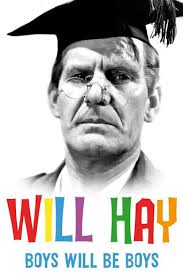
Boys Will Be Boys is a 1935 British comedy film directed by William Beaudine which stars Will Hay, Gordon Harker and Jimmy Hanley. The film is set at Narkover School, where headmaster Doctor Alec Smart becomes involved in the disappearance of a valuable necklace.

The Amazing Dr. Clitterhouse is a 1938 American crime film directed by Anatole Litvak and starring Edward G. Robinson, Claire Trevor and Humphrey Bogart. It was distributed by Warner Bros. and written by John Wexley and John Huston, based on the 1936 play The Amazing Dr. Clitterhouse, the first play written by short-story writer Barré Lyndon, which ran for three months on Broadway with Cedric Hardwicke after playing in London.
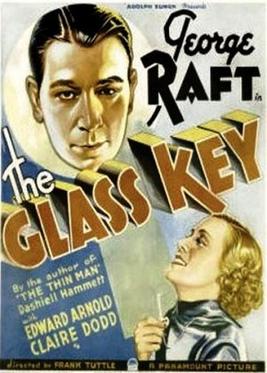
The Glass Key is a 1935 American crime drama film directed by Frank Tuttle starring George Raft, Edward Arnold, Claire Dodd, Guinn "Big Boy" Williams and Ray Milland. Ann Sheridan has a brief speaking role as Raft's character's nurse in their first film together. Produced and distributed by Paramount Pictures, it was based upon the 1931 suspense novel The Glass Key by Dashiell Hammett,
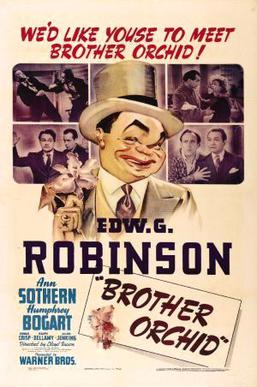
Brother Orchid is a 1940 American crime/comedy film directed by Lloyd Bacon and starring Edward G. Robinson, Ann Sothern and Humphrey Bogart, with featured performances by Donald Crisp, Ralph Bellamy and Allen Jenkins. The screenplay was written by Earl Baldwin, with uncredited contributions from Jerry Wald and Richard Macauley, based on a story by Richard Connell originally published in Collier's Magazine on May 21, 1938. Prior to the creation of the movie version of Connell's story, a stage adaptation was written by playwright/novelist Leo Brady. The script was originally produced at Catholic University of America in Washington, D.C..
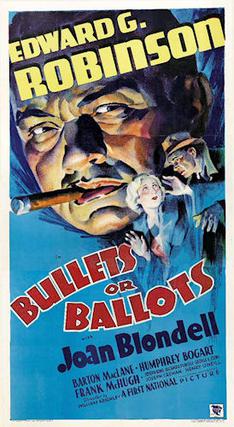
Bullets or Ballots is a 1936 American crime thriller film starring Edward G. Robinson, Joan Blondell, Barton MacLane, and Humphrey Bogart. Robinson plays a police detective who infiltrates a crime gang. This is the first of several films featuring both Robinson and Bogart.

Charlie Chan in Shanghai is the ninth Charlie Chan film produced by Fox Film Corporation with the title character played by Warner Oland.

The Case of the Lucky Legs is a 1935 mystery film, the third in a series of Perry Mason films starring Warren William as the famed lawyer.
Public Hero ﹟1 is a 1935 American crime film starring Lionel Barrymore, Jean Arthur, Chester Morris and Joseph Calleia. The Metro-Goldwyn-Mayer production was directed by J. Walter Ruben.

The Man Who Broke the Bank at Monte Carlo is a 1935 American romantic comedy film made by 20th Century Fox. It was directed by Stephen Roberts, and starred Ronald Colman, Joan Bennett, and Colin Clive. The screenplay was written by Nunnally Johnson and Howard Smith, based on a play by Ilya Surgutchoff and Frederick Albert Swan. The film was inspired by the song of the same name popularised by Charles Coborn.

The Gay Desperado is a 1936 American musical-comedy film starring Ida Lupino, Leo Carrillo, and Nino Martini and directed by Rouben Mamoulian, produced by Mary Pickford and Jesse Lasky and originally released by United Artists. The film is a spoof of the Hollywood gangster genre.

Marked Men is a 1940 American film directed by Sam Newfield for Producers Releasing Corporation.

Oil for the Lamps of China is a 1935 drama film starring Pat O'Brien and Josephine Hutchinson. It is based on the novel of the same name by Alice Tisdale Hobart. A man blindly puts his faith in his employer. The film was loosely remade in 1941 as Law of the Tropics.
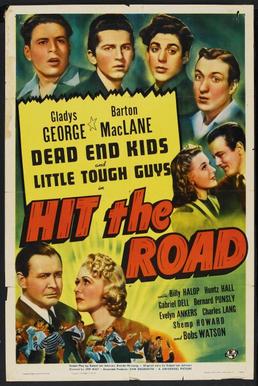
Hit the Road is a 1941 American comedy crime film directed by Joe May and featuring the Dead End Kids and Little Tough Guys alongside Gladys George, Barton MacLane and Evelyn Ankers. It was produced and distributed by Universal Pictures.

The Perfect Gentleman is a 1935 American comedy film directed by Tim Whelan and starring Frank Morgan, Cicely Courtneidge and Heather Angel. It was based on a play by Edward Childs Carpenter. The screenplay concerns the father of a British country vicar, who almost brings scandal on the family when he becomes entangled with an actress.

King of the Underworld is a 1939 American crime drama film starring Humphrey Bogart as a gangster and Kay Francis as a doctor forced to treat him. It was directed by Lewis Seiler. It is a remake of the 1935 film Dr. Socrates, which was based on a short story by W. R. Burnett.
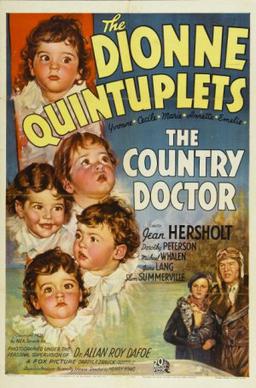
The Country Doctor is a 1936 American drama film directed by Henry King and written by Sonya Levien. The film stars Jean Hersholt, June Lang, Slim Summerville, Michael Whalen, Dorothy Peterson and Robert Barrat. The Country Doctor was released on March 12, 1936, by 20th Century Fox.

Marshal of Laredo is a 1945 American Western film directed by R.G. Springsteen in his first feature film starring Wild Bill Elliott in the role of Red Ryder and costarring as Little Beaver, actor (Bobby) Robert Blake. It was the eleventh of twenty-three Red Ryder feature films that would be produced by Republic Pictures. The picture was shot on the studio’s back lot along with outdoor locations at Iverson Ranch in Chatsworth, Los Angeles, CA, US.



















